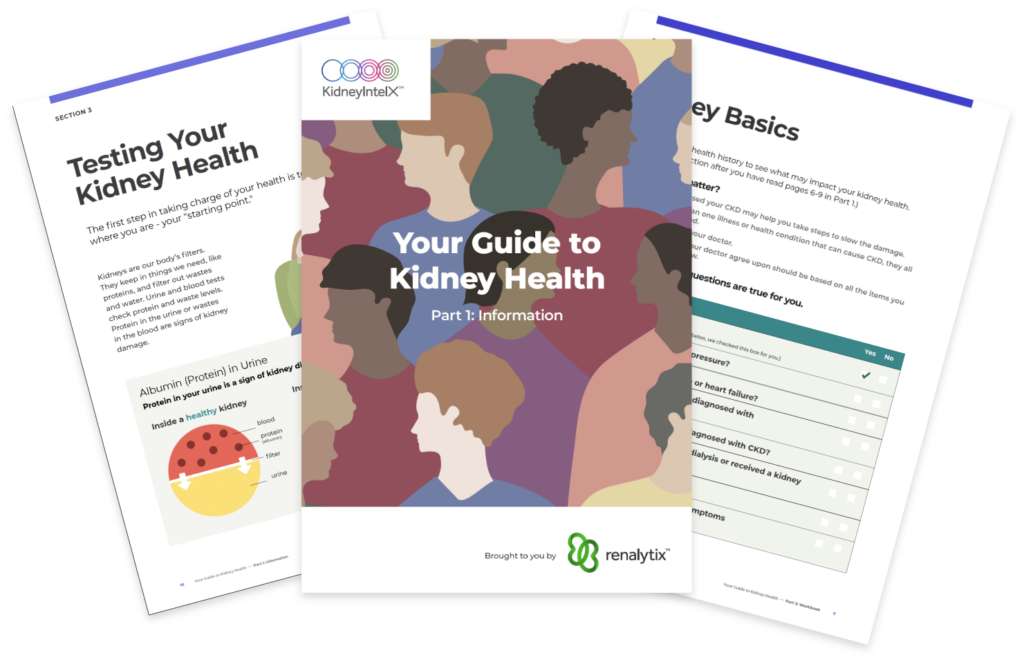Q: Could the kidneyintelX.dkd™ test help me manage my kidney disease?
A: If you have Type 2 Diabetes and Kidney Disease and meet the criteria for the test, a kidneyIntelX.dkd assessment gives your doctor information about your future risk. In this way, it can help you and your doctor know what is best for treating your kidney disease while also improving your heart health.
Q: When is the kidneyintelX.dkd test ordered?
A: The kidneyintelX.dkd test can be ordered if you have early-stage kidney disease, stages 1-3b, to help you and your doctor understand your individual risk for progressive decline in kidney function over the next five years. Your risk ‘result’ can help you and your doctor discuss a plan to slow, or in some cases, prevent progression of your disease which can also improve your heart health.
Q: What is being tested by kidneyintelX.dkd?
A: kidneyintelX.dkd is a simple, non-fasting blood test that measures three proteins associated with your kidney health. That information, combined with other data from your medical record, is used to calculate your individual risk (low, moderate, or high) for progression of your kidney disease over the next five years.
Think of the test as a “tool” that helps you and your doctor decide whether you need to make any immediate changes to your care, including medication changes or talking to a specialist.
Q: How will my care change based on the test result?
A: The good news: most patients will get a low risk result from their kidneyintelX.dkd test.
If you receive a moderate or high risk result, by finding out about your risk early, it will give you and your doctor more control over what to do next. That can include changes to your medications, talking to a specialist and making lifestyle changes that may help slow disease progression to avoid further injury to your kidneys.
Q: Who on my care team can order the kidneyintelX.dkd test?
A: A licensed medical person, who is part of your diabetes care team, can order kidneyintelX.dkd. That includes your primary care doctor, nurse practitioner (NP), physician’s assistant (PA), your diabetes doctor (endocrinologist), heart doctor (cardiologist) or kidney doctor (nephrologist).
Q: What is the testing process?
A: We will take some blood from your arm and send your blood sample to the laboratory that performs the kidneyintelX.dkd test. The laboratory will send your result to your doctor in five to seven days.
Q: Is there any special preparation needed before I take the test?
A: No. It is a simple blood test that does not even require fasting.
Q: What does my test result mean?
A: The result shows your level of risk for a progressing decline of your kidney function in the next five years.
Q: On average, how many patients fall into each risk group?
According to our clinical study, patients fall within one of three risk levels (high, moderate, low):
- Approximately 55% of patients tested with kidneyintelX.dkd received a ‘Low’ risk result.
- Approximately 35% of patients tested with kidneyintelX.dkd received a ‘Moderate’ risk result.
- Approximately 10% of patients tested with kidneyintelX.dkd received a ‘High’ risk result.
Q: How will I get my test result?
A: Your doctor will receive your kidneyintelX.dkd result in approximately five to seven days. Schedule time to discuss your result with him or her.
Q: Who do I call if I do not understand my test result or do not receive my result?
A: You should check with your doctor’s office first. If you still have questions, you can reach out to our Patient Support Team at 888.203.2725 during normal hours.
